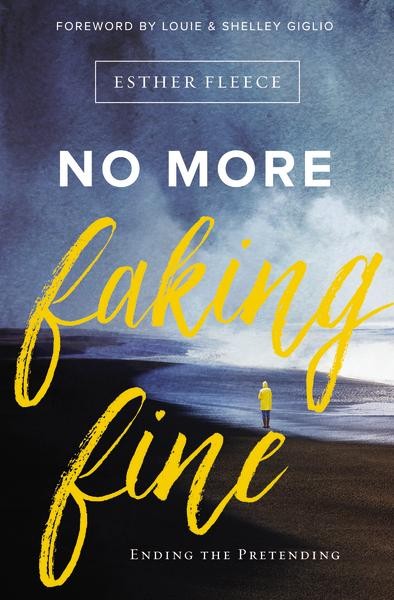 When I saw the cover for Esther Fleece’s new book, I felt as if she’d written it just for me. The press release for No More Faking Fine: Ending the Pretending came at a time when I realized I’d been faking and pretending… and I wanted to stop. Over the last couple of weeks, I’ve devoured Esther’s book. Her insight into the Biblical practice of lament as a path to healing is powerful and freeing.
When I saw the cover for Esther Fleece’s new book, I felt as if she’d written it just for me. The press release for No More Faking Fine: Ending the Pretending came at a time when I realized I’d been faking and pretending… and I wanted to stop. Over the last couple of weeks, I’ve devoured Esther’s book. Her insight into the Biblical practice of lament as a path to healing is powerful and freeing.
Esther begins No More Faking Fine with a story from her childhood—a moment which deeply impacted her. It was the day she began pretending:
The lesson I internalized was that hiding my pain was the only way to please others, the only way my pain and fears couldn’t be used against me, the only way to stay safe. I was determined to never again let anyone see what was really going on inside me. … I was only ten years old, but I vowed from then on to pretend I was fine. I was easier that way. It didn’t hurt as much.
I read that short paragraph over and over again. Esther’s words made me realize I had learned a similar lesson somewhere in my childhood, though I can’t pinpoint the exact moment as she can. She goes on to say that God wants our emotions. All of them—the happy, the sad, the good, the bad.
God does not expect us to have it all together. … [He] understands that life is full of pressures, hurts, stings. He took on flesh so He could relate to us in both our joy and pain. He wants us to feel and express every emotion before Him and not minimize a thing. There is no “fake it till you make it” in Scripture. When we fake fine, we fake our way out of authentic relationship with God, others, and ourselves.
Over and over through the Bible, we read stories of lament. Stories where God’s people cried out to Him, demanding to know why. From the Israelites in Egypt to Job at Satan’s hands, God’s people lament. Some of the best laments are recorded in the Pslams. And it is these stories and laments that taught Esther to face her own pain and walk through it to help others.
Esther is open and honest about the struggles she’s faced in her life. Her dad was mentally unstable and ended up in prison, then began stalking her. Her mom was emotionally abusive. She has lived out of suitcases more often than a home. Her grandmother and extended family abandoned her. Yet through it all, God provided for her in other ways.
In the first part of No More Faking Fine, Esther talks about pretending—and what it cost her. She shares that “God wants our sad” and that emotions can’t scare Him. She talks about letting go of our coping mechanisms, offering concrete examples of some of the ways she dealt with her pain. She then shares her revelation about lament and how this discovery started her on a path to healing.
In Part 2, Esther shares her insight into this new way to pray. She looks at Biblical laments and explains that it’s okay to ask God “why?” and “How long?” Throughout the Bible, God’s people—including men and women closest to Him, like King David—have asked those very questions. These prayers during hard times give Esther—and us—a model for our own prayers during difficult situations.
In the final part, Esther talks about the season of life. Lament isn’t a space in which we are to remain; rather, we are called to move on into healing. Esther also talks about lamenting together. As we use lament to heal our own pain, we are able to reach out to others facing similar pain. She says, “The beauty of walking through lament to sing a new song is that it brings us together to care for those who are still in lament.”
For many of us, when someone asks how we’re doing, our automatic response is “fine”—even when we aren’t. Esther Fleece transparently shares her story of “faking fine” until she couldn’t anymore—and how God has brought emotional healing as she learned to stop pretending. This is an encouraging and helpful book. ~ Jim Daly, president of Focus on the Family.
No More Faking Fine is a moving, powerful book about prayer and our relationships with God and others. Esther is honest about her own pain, her attempts to deal with that pain by hiding or ignoring it, and how God helped her lament it and find healing. I’ve read my Bible many times over, but Esther gave me new insight into the old familiar stories. I’ve never thought about lament the way that she describes it.
To find out more about Esther or No More Faking Fine, drop by her website. You can share your own story of “Ending the Pretending” and read other stories, including Gary Thomas’ and Jim Daly’s.
Esther Fleece is a writer on millennials and faith. She has been recognized among Christianity Today’s “Top 50 Women Shaping the Church and Culture” and CNN’s “Five Women in Religion to Watch.” In addition to writing and speaking, Fleece is founder and CEO of L&L Consulting, Inc., where she helps new and established Christian ministries develop innovative strategies. When Esther isn’t teaching, leading, writing, speaking, reading, connecting, or traveling… she is shopping.

No Responses Yet